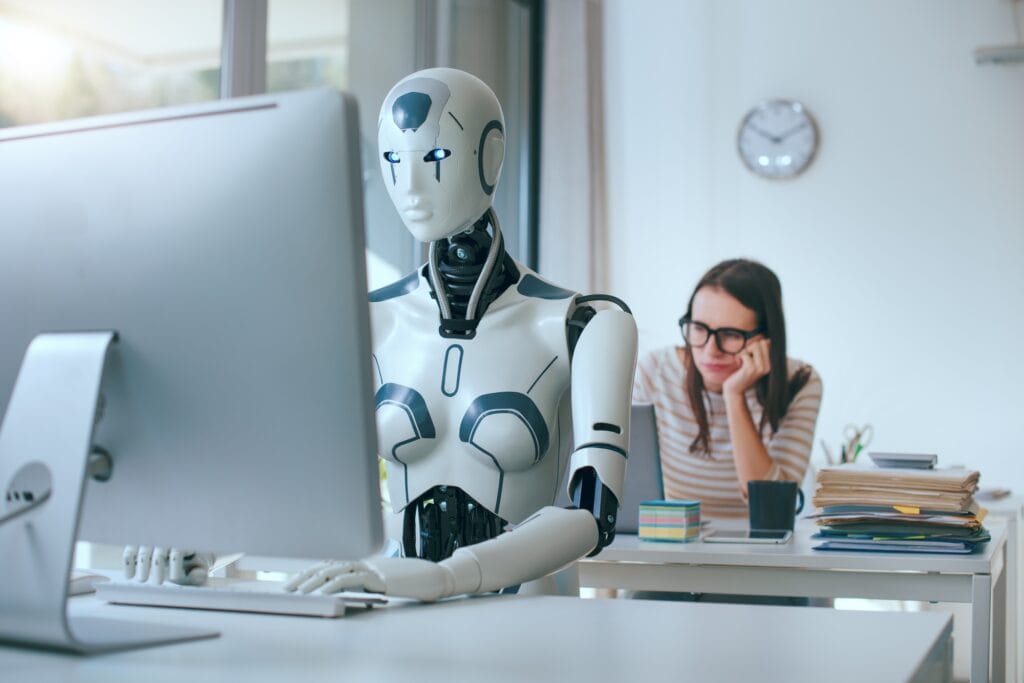Artificial intelligence (AI) is rapidly changing many industries, and video production is no exception. Much like the internet revolutionized the modern workplace, AI is poised to bring about a similar paradigm shift in how we create and consume video content. How The impact of AI on Video Production will reflected in 2025?
AI-powered tools are already being used in various stages of video production, from pre-production to post-production, and their impact is only expected to grow in the coming years. This article will explore how AI is transforming the video production landscape in 2025, examining its potential benefits and challenges and considering its implications for the industry’s future.
Current State of AI in Video Production
AI is already making significant inroads into the video production industry. AI-powered tools are being used to automate tasks such as video editing, color correction, and even scriptwriting. This automation is helping to improve efficiency and reduce costs, allowing video producers to focus more on the creative aspects of their work.
One of the most significant ways AI is being used in video production is in the area of video editing. AI-powered video editing software can automatically analyze footage and make intelligent editing decisions, such as cutting out unnecessary footage, adding transitions, and even color correcting. This can save video editors a significant amount of time and effort, allowing them to focus on more creative tasks. For example, Adobe Sensei, integrated into Adobe Premiere Pro, offers features like Auto Reframe, which automatically adjusts aspect ratios for different platforms, and Scene Edit Detection, which identifies cuts in edited footage.
AI is also being used to analyze audience data to create more effective video marketing campaigns. By understanding viewer preferences and behavior, AI can help producers tailor their content to specific demographics and maximize engagement2.
AI is also being used to assist in generating video content. AI-powered video generators can create certain types of videos, such as talking-head videos or short animated clips, using text prompts or even still images. While this technology is still under development, it has the potential to streamline the video creation process and enable new forms of video content6.
Furthermore, AI is playing a crucial role in real-time analytics on set. By analyzing footage as it’s captured, AI can provide immediate feedback to directors and videographers, allowing them to adjust lighting, framing, and even actor performances in real-time. This capability enhances efficiency and ensures that each shot meets the desired criteria.
Other areas where AI is being used in video production include:
- Automated transcription and subtitling: AI can automatically generate transcripts and subtitles for videos, making them more accessible to a wider audience7.
- Voice synthesis and dubbing: AI can generate realistic-sounding voiceovers and dubbing, making it easier to localize content for different markets8.
- Visual effects: AI can be used to create realistic visual effects, such as explosions, fire, and smoke, with greater efficiency and precision9.
Building upon the current applications of AI, the future of video production in 2025 promises even more transformative changes.
Projected Impact of AI on Video Production in 2025
The impact of AI on video production is only expected to grow in 2025. As AI technology continues to develop, we can expect to see even more sophisticated tools and applications emerge. Some of the key ways AI is projected to impact video production in 2025 include:
- Increased automation: AI will continue to automate more tasks in the video production process, further improving efficiency and reducing costs10. This includes tasks like personalized content scheduling and automatic metadata extraction, which can streamline workflows and improve content organization.
- Enhanced creativity: AI will provide video producers with new tools and capabilities to enhance their creativity and produce more engaging content12. AI can transform media consumption from a passive experience to an interactive and personalized one, with content adapting to individual viewer preferences.
- Improved personalization: AI will enable video producers to create more personalized video experiences for viewers11. This includes creating AI-powered support videos that provide users with tailored guidance and assistance, improving customer satisfaction and product usage.
- Greater accessibility: AI will make video production more accessible to a wider range of people, including those with limited technical skills.
Moreover, AI is expected to merge with virtual reality (VR) and augmented reality (AR) technologies, creating immersive experiences that engage viewers in new ways14. This convergence of AI, VR, and AR has the potential to revolutionize storytelling and create entirely new forms of video content.
Another significant impact of AI in video production relates to the concept of “monoculture.” In the past, monoculture referred to shared cultural experiences fostered by mass media. With the rise of streaming and fragmented media consumption, this shared experience has diminished. However, AI-generated video content, with its potential for personalization and mass appeal, might contribute to a new form of monoculture, where diverse audiences connect through shared AI-driven narratives and experiences15.
Specific AI Tools and Technologies for Video Production
A wide range of AI tools and technologies are being developed for video production, each catering to different needs and stages of the production process. Here are some notable examples:
AI Video Generation Tools:
- Synthesia: This platform allows users to create realistic talking-head videos from text, making it ideal for creating presentations, training videos, and other types of video content that feature human presenters16.
- Pictory: This tool specializes in creating short, engaging videos from long-form content, such as blog posts and articles. It can automatically extract key information and visuals from text and assemble them into concise and shareable videos17.
AI Video Editing Tools:
- Runway ML: This open-source platform provides users with access to cutting-edge AI tools for video editing and special effects. It offers a range of features, including style transfer, object removal, and image generation, allowing editors to experiment with new creative techniques18.
- Descript: This tool allows users to edit videos by editing the transcript. By simply modifying the text, users can make changes to the corresponding video footage, streamlining the editing process and making it more accessible to those with limited editing experience9.
AI-Powered Platforms and Suites:
- Adobe Sensei: This is Adobe’s AI technology that is integrated into its Creative Cloud suite of products, including Premiere Pro and After Effects. It offers a range of features, such as automated color correction, audio enhancement, and content-aware fill, that can significantly speed up the editing workflow4.
Case Studies and Examples of AI in Video Production
Several companies are already using AI to improve their video production workflows and achieve impressive results. Here are some notable examples:
- CoreLogic Inc.: This company used Hour One’s AI video generation platform to cut video creation time by 90%. By leveraging AI to automate the video creation process, CoreLogic was able to produce high-quality videos more efficiently and cost-effectively19.
- FOX: This media company used Amazon’s AI-driven tools to gain insights from consumer data and create more personalized content recommendations. This allowed FOX to better understand its audience and deliver more relevant and engaging content20.
- Magisto: This AI-powered video editing app automatically selects the best footage and creates polished videos based on the desired theme. This makes video editing accessible to a wider audience, allowing anyone to create professional-looking videos with minimal effort21.
- Raydiant: This company provides a digital signage solution that uses AI to curate and display content based on viewer demographics and engagement. This allows businesses to personalize the content shown on their digital signage, making it more relevant and effective21.
Potential Benefits and Challenges of Using AI in Video Production
AI offers several potential benefits for video production, including:
- Increased efficiency and productivity: AI can automate many time-consuming tasks, freeing up video producers to focus on more creative work22. This includes tasks like video editing, color correction, audio enhancement, and even scriptwriting.
- Reduced costs: AI can help to reduce the cost of video production by automating tasks and making it possible to create videos with smaller teams22. This can make video production more affordable for businesses of all sizes.
- Enhanced creativity: AI can provide video producers with new tools and capabilities to enhance their creativity and produce more innovative content22. AI can generate new ideas, suggest creative edits, and even create entirely new forms of video content.
- Improved quality: AI can help to improve the quality of videos by automating tasks such as color correction and audio enhancement23. This can result in more polished and professional-looking videos.
- Increased accessibility: AI can make video production more accessible to a wider range of people, including those with limited technical skills22. AI-powered tools can simplify the video production process, making it easier for anyone to create videos.
- Enhanced accessibility for viewers: AI can automatically generate audio descriptions for videos, making them more accessible to visually impaired audiences12. This can help to ensure that video content is inclusive and reaches a wider audience.
Challenges of Using AI in Video Production
While the potential benefits of AI in video production are significant, there are also challenges that need to be addressed:
- Lack of emotional intelligence: AI still struggles to understand and replicate human emotions, which can be a limitation when creating videos that need to evoke an emotional response22. While AI can analyze patterns and replicate styles, it may not always capture the nuances of human emotion and storytelling.
- Data dependency: AI algorithms require large amounts of data to train, which can be a barrier for smaller video production companies22. Access to large datasets is essential for training effective AI models, which can be a challenge for those with limited resources.
- Potential for bias: AI algorithms can reflect the biases present in the data they are trained on. This can lead to AI-generated content that perpetuates harmful stereotypes or excludes certain groups22. It is crucial to ensure that AI models are trained on diverse and representative datasets to mitigate bias.
Impact of AI on Roles and Skills in Video Production
The increasing use of AI in video production is likely to have a significant impact on the roles and skills needed in the industry. While some jobs may be automated, new jobs will also be created. For example, there will be a growing need for people with skills in AI development, data analysis, and AI-powered video editing1.
Video producers will need to adapt to the changing landscape by developing new skills and embracing AI tools. Those who are able to effectively utilize AI will be well-positioned for success in the future of video production.
Potential Impact of AI on the Cost and Accessibility of Video Production
AI has the potential to significantly reduce the cost of video production. By automating tasks and making it possible to create videos with smaller teams, AI can make video production more affordable for businesses of all sizes1.
AI can also make video production more accessible to a wider range of people. AI-powered tools can simplify the video production process, making it easier for people with limited technical skills to create professional-looking videos. This could lead to a democratization of video production, with more people able to create and share their own videos1.
Conclusion
AI is transforming the video production landscape in 2025, offering new possibilities for creativity, efficiency, and accessibility. While there are challenges to overcome, the potential benefits of AI are significant. Video producers who embrace AI and develop the necessary skills will be well-positioned for success in the future of video production. The industry must also address the ethical considerations surrounding AI and ensure that it is used responsibly to enhance human creativity rather than replace it.
The adoption of AI in video production has broader implications that extend beyond simply automating tasks. AI has the potential to fundamentally change the nature of creativity in video production, empowering artists and storytellers with new tools and techniques. It will also lead to an evolution of the skills needed for video professionals, with a growing demand for expertise in AI development, data analysis, and AI-powered video editing.
Furthermore, AI is likely to drive the creation of new forms of video content and storytelling. Interactive narratives, personalized video experiences, and immersive VR/AR integrations are just some of the possibilities that AI can unlock. As AI technology continues to evolve, we can expect to see even more innovative applications emerge, further revolutionizing the way videos are created and consumed.
Works cited
- How AI Is Transforming the Video Production Landscape, accessed January 13, 2025, https://www.streamingmedia.com/Articles/Editorial/Featured-Articles/How-AI-Is-Transforming-the-Video-Production-Landscape-166104.aspx
- The State Of AI In Video Production, accessed January 13, 2025, https://explainervideoproduction.com/ai-in-video-production/
- www.streamingmedia.com, accessed January 13, 2025, https://www.streamingmedia.com/Articles/Editorial/Featured-Articles/How-AI-Is-Transforming-the-Video-Production-Landscape-166104.aspx#:~:text=AI%2Ddriven%20editing%20software%2C%20like,removing%20pauses%20and%20filler%20words.
- 5 Ways You Can Use AI in Video Production – thunder::tech, accessed January 13, 2025, https://www.thundertech.com/blog-news/march-2024/5-ways-you-can-use-ai-in-video-production
- The Future of AI in Video Production [AI Video Editing and Production] – BLARE Media, accessed January 13, 2025, https://blaremedia.net/the-future-of-ai-in-video-production/
- How Artificial Intelligence Is Redefining The Video Industry – DataArt, accessed January 13, 2025, https://www.dataart.com/blog/how-artificial-intelligence-is-redefining-the-video-industry-by-max-kalmykov
- AI In Video Production: Its Potential & Its Pitfalls – Levitate Media, accessed January 13, 2025, https://levitatemedia.com/learn/ai-video-production
- How AI Is Changing the Video Production Industry (Updated 2024) – Lemonlight, accessed January 13, 2025, https://www.lemonlight.com/blog/how-ai-is-changing-the-video-production-industry/
- The 9 best AI video generators in 2024 – Zapier, accessed January 13, 2025, https://zapier.com/blog/best-ai-video-generator/
- How AI Will Transform Video Management by 2025 – EnterpriseTube, accessed January 13, 2025, https://enterprisetube.com/blog/how-ai-will-transform-video-management-by-2025
- Looking forward: key industry figures on AI and media tech in 2025 – TVBEurope, accessed January 13, 2025, https://www.tvbeurope.com/artificial-intelligence/looking-forward-key-industry-figures-on-ai-and-media-tech-in-2025
- How AI is Shaping Media & Entertainment in 2025 – VideoNuze, accessed January 13, 2025, https://www.videonuze.com/perspective/how-ai-is-shaping-media-entertainment-in-2025
- 5 AI video trends to watch in 2025 – Videate Blog, accessed January 13, 2025, https://blog.videate.io/ai-video-trends-to-watch-in-2025
- What Are the Latest AI Innovations Affecting Video Production? – Start Motion Media, accessed January 13, 2025, https://www.startmotionmedia.com/what-are-the-latest-ai-innovations-affecting-video-production/
- Lights, Camera, Algorithms: Will AI Turn Us All Into Movie Stars? – Forbes, accessed January 13, 2025, https://www.forbes.com/sites/michaelashley/2025/01/13/lights-camera-algorithms-will-ai-turn-us-all-into-movie-stars/
- 16 Best AI Video Generators (2025) – Synthesia, accessed January 13, 2025, https://www.synthesia.io/post/best-ai-video-generators
- 10 Best AI Tools for Video Editing & Production | SproutVideo, accessed January 13, 2025, https://sproutvideo.com/blog/ai-tools-video-production.html
- 10 AI Video Tools to Elevate Your Content Creation | DigitalOcean, accessed January 13, 2025, https://www.digitalocean.com/resources/articles/ai-video-tools
- AI Video Case Studies – Hour One, accessed January 13, 2025, https://hourone.ai/case-studies/
- 5 AI Case Studies in Entertainment – VKTR.com, accessed January 13, 2025, https://www.vktr.com/ai-disruption/5-ai-case-studies-in-entertainment/
- Top 15 Real-Life Use Cases For AI In the Entertainment Industry – Redress Compliance, accessed January 13, 2025, https://redresscompliance.com/top-15-real-life-use-cases-for-ai-in-the-entertainment-industry/
- The Power of AI in Video Production: Automating Workflows and …, accessed January 13, 2025, https://www.startmotionmedia.com/the-power-of-ai-in-video-production-automating-workflows-and-personalizing-content/
- AI in Video Production – Pigeon Studio, accessed January 13, 2025, https://studiopigeon.com/blog/ai-in-video-production/
- Where AI is Useful for Video Production and Where It Falls Flat, accessed January 13, 2025, https://boldcontentvideo.com/2024/06/11/where-ai-is-useful-for-video-production-and-where-it-falls-flat/





